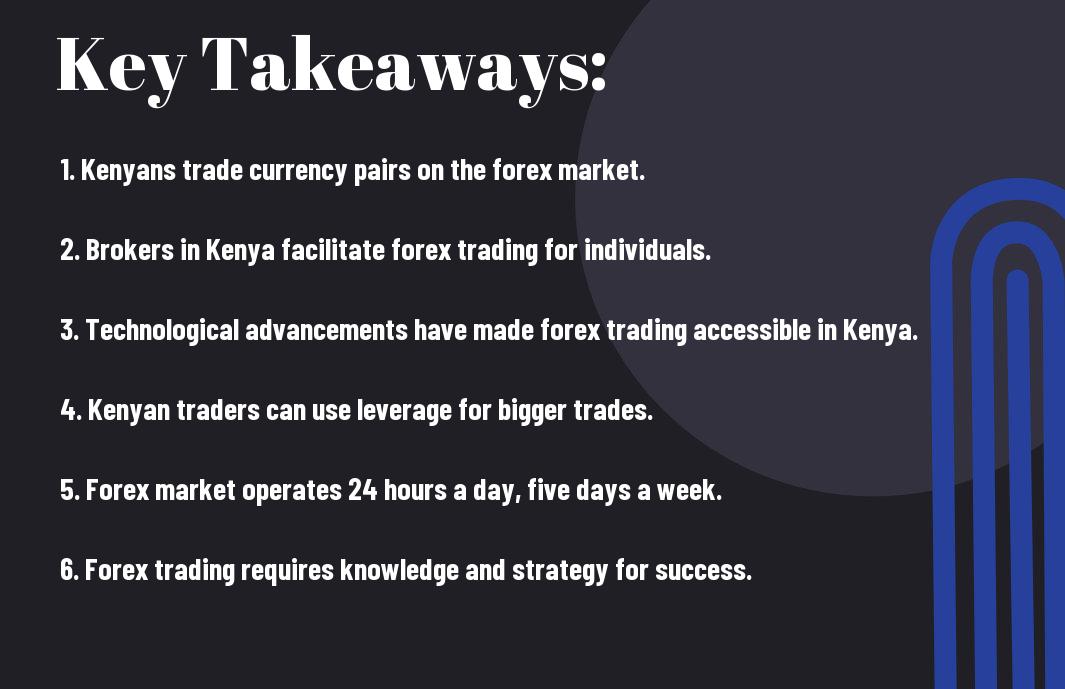With the ever-increasing popularity of forex trading in Kenya, it is imperative to understand how this financial market operates. Forex trading involves buying and selling currency pairs with the aim of making a profit from the exchange rate fluctuations. Individuals can trade through licensed forex brokers who provide access to the global currency market. It is important to note that while forex trading can be highly profitable, it also carries a significant level of risk due to the volatile nature of the market. As with any investment, it is crucial to educate oneself and use risk management strategies to protect against potential losses.
Key Takeaways:
- Regulation: Forex trading in Kenya is regulated by the Capital Markets Authority (CMA) to ensure transparency and protect investors.
- Online Platforms: Traders in Kenya can access the forex market through online platforms provided by licensed brokers, allowing them to trade various currency pairs.
- Risk Management: It is important for forex traders in Kenya to manage their risks effectively by setting stop-loss orders and practicing good money management strategies to protect their investments.

Understanding Forex Trading
Basic Forex Trading Concepts
To have a solid foundation in forex trading, it is necessary to grasp some basic concepts first. Understanding the terms leverage, margin, and pips is crucial for navigating the forex market successfully. Leverage allows traders to control a large position with a relatively small amount of capital. Margin is the amount of money required to open a position, while pips are the unit of measurement for the change in value between two currencies.
The Currency Pairs and Their Dynamics
When trading forex, currencies are traded in pairs, where one currency is exchanged for another. The most traded currency pair is EUR/USD, representing the euro against the US dollar. The dynamics of currency pairs are influenced by various factors such as economic indicators, geopolitical events, and market sentiment. Traders must be aware of these dynamics to make informed trading decisions.
Forex Trading Mechanisms in Kenya
Regulatory Framework
Forex trading in Kenya is regulated by the Capital Markets Authority (CMA), which oversees all forex brokers operating in the country. The CMA ensures that all market participants comply with regulations to protect investors’ interests and maintain market integrity. Traders are advised to only engage with brokers licensed by the CMA to ensure a safe trading environment.
Key Players and Market Structure
To understand the forex market structure in Kenya, it is crucial to recognize the key players involved. These include commercial banks, licensed forex brokers, institutional investors, and individual traders. Commercial banks play a significant role in providing liquidity and market access to traders. Licensed forex brokers offer platforms for retail traders to participate in the market, while institutional investors influence market movements on a larger scale.
Players in the Kenyan forex market should be aware of the risks and opportunities involved. Individual traders can benefit from the flexibility and potential profitability of forex trading, but they must also navigate the volatility and regulatory environment. Understanding the role of key players and market dynamics is crucial for success in forex trading in Kenya.
Getting Started with Forex Trading in Kenya
Opening a Forex Trading Account
All aspiring forex traders in Kenya need to start by opening a forex trading account. This involves selecting a reliable broker, providing the necessary documentation for verification, and depositing funds to start trading. It’s crucial to choose a broker regulated by the Capital Markets Authority (CMA) to ensure the security of your investments and compliance with Kenyan laws.
Tools and Platforms for Trading
Opening a forex trading account will provide you access to various tools and platforms for trading. These tools include technical analysis charts, economic calendars, and trading indicators that can help you make informed trading decisions. Additionally, you will have access to trading platforms such as MetaTrader 4 (MT4) or MetaTrader 5 (MT5), which are popular among forex traders for their user-friendly interface and advanced features.
Understanding the tools and platforms available for forex trading is crucial for your success in the market. These tools can help you analyze market trends, identify profitable trading opportunities, and manage your trades effectively. However, it’s important to exercise caution and conduct thorough research before using any tool or platform to avoid making risky decisions that could result in financial losses.
Strategies and Risk Management
Common Trading Strategies
Many successful forex traders in Kenya employ a variety of trading strategies to maximize their profits. With strategies such as trend following, range trading, and breakout trading, traders aim to predict price movements and capitalize on them. Each strategy requires a different approach and understanding of market conditions to be effective.
Risk Management Techniques
Many traders underestimate the importance of proper risk management techniques when engaging in forex trading. Risk management involves strategies such as setting stop-loss orders, using proper position sizing, and diversifying one’s portfolio to mitigate potential losses. Traders who neglect risk management often end up with significant losses that could have been prevented.
Common risk management techniques also include keeping leverage levels in check, avoiding emotional trading decisions, and constantly monitoring market conditions for any potential risks. Proper risk management is crucial to long-term success in forex trading and is often the differentiator between a profitable trader and one who ends up losing their investment.
To wrap up
Now you have a clear understanding of how forex trading works in Kenya. It involves speculating on the exchange rate between two currencies, buying one currency while selling another. Traders can profit from these fluctuations and make money through well-informed decisions. This form of trading is legal in Kenya and requires a licensed broker to facilitate transactions. By staying knowledgeable about the market, applying risk management strategies, and practicing discipline, you can navigate the complexities of forex trading successfully in Kenya.
FAQ
Q: What is forex trading?
A: Forex trading, also known as foreign exchange trading, is the buying and selling of currencies on the foreign exchange market with the aim of making a profit. In simpler terms, it involves trading one currency for another in the hopes of profiting from the fluctuations in exchange rates.
Q: How does forex trading work in Kenya?
A: In Kenya, forex trading is typically done through online platforms provided by brokers. Traders can open an account with a licensed forex broker, deposit funds, and start trading various currency pairs. The trading platform allows traders to monitor currency prices, place orders, and manage their trades in real-time.
Q: What are the risks involved in forex trading in Kenya?
A: Forex trading in Kenya, like any other form of trading, carries certain risks. These risks include market volatility, leverage risks, counterparty risks, and regulatory risks. It is important for traders to educate themselves about the forex market, use risk management tools, and trade responsibly to minimize potential losses.
